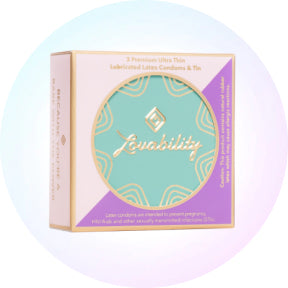Myths about masturbation and self-pleasure have been around forever. Most of them are just trying to make people feel fear or shame about masturbating. For women especially, they have contributed heavily to a culture that denies women their agency as sexual beings and wants to commodify women’s sexual “purity.” Fear and ignorance about sex and health are two huge things standing between us and being able to embrace our sexual power.
As a sex-positive feminist who’s tired of seeing people peddle these lies in 2020, it’s time to set the record straight. So, for masturbation month, I am here to unpack (read: DESTROY) 6 of the most prominent masturbation myths.
MYTH #1: Masturbation is dirty, perverted, or straight-up bad for you.
FACT: Self-pleasure is healthy, completely normal, and good for you!
Masturbation has long been part of the taboo club when it comes to talking about sex. Tall tales about its effects on your wellbeing are all over the place. Rubbing one out (or in) will not make you infertile, make hair grow out of your palms, or cause acne. It is also not a reflection of “perversion.”
In fact, our current ideas about what is and is not “perverse” have shifted and changed throughout history, so there is really no concrete and universal definition. For example, lots of sexual kinks have historically been condemned as “perverse,” but with the modern sex-positive movement, these practices and desires have been largely de-stigmatized in favor of an attitude that affirms the sexual choices of others (as long as they are consensual).
Masturbation can actually have a ton of health benefits like reducing stress, strengthening the pelvic floor, and helping you get to sleep!
MYTH #2: Girl’s don’t masturbate.
FACT: Girls masturbate all the fucking time!
This particular myth comes from the long history of women being denied their sexual power and agency. Women are not taught to embrace their sexuality — rather than have sexual agency, we are seen as sex objects. We’re taught that to be desirable we should be sexy, but at the same time we’re punished by society for being sexual.
Masturbation can be thought of as an incredibly feminist act — it encourages us to love and explore our bodies and our sexuality, and it reaffirms that we don’t need a partner to experience pleasure and that sex isn’t just about penetration.
Saying that masturbation isn’t an appropriate activity for women, or that it’s not “feminine”, is deeply misogynistic, and only reproduces the idea that women aren’t allowed to be sexual beings or own their sexual power. Girls masturbate, use toys and lube, and engage in all kinds of sexy activities –– and it’s honestly so amazingly subversive.
MYTH #3: You can lose your virginity from masturbating.
FACT: “Virginity” is an idea, so you can’t really “lose it.”
First of all, “virginity” doesn’t exist — it’s a social construct. The idea of virginity is a concept that has been created by society. It’s not rooted in biology, and it only continues to be perpetrated, constructed, and enforced by human behaviors and beliefs. When a social construct has been enforced by the dominant culture for a very long time, it becomes a social norm. This is why lots of people still hold antiquated (and inherently sexist) beliefs about virginity — most notably that it has anything to do with the “worth” or “purity” of a woman.
So because virginity doesn’t exist you can’t lose it by masturbating. The first time you choose to share your body with another human, no matter what that interaction might look like, can be, and is, treated by many people as a special moment. Masturbating, taking the time to explore and empower your own sexuality, won’t take anything away from that experience. In fact, it can actually enhance it. Especially since masturbating can help you figure out what kinds of stimulation you like, and equip you to communicate your desires to your partner(s).
MYTH #4: You can break or tear your hymen during masturbation.
FACT: Everyone’s hymen is different, and stretching is totally natural.
A big part of the virginity myth is centered around the “breaking” or “tearing” of the hymen during first penetration. We’re warned about the bleeding, pain, and general discomfort that accompanies the breaking of this membrane, and that this will result in an irreparable physical change that is easily detected by future intimate partners or others who wish to verify our virginity.
Often we’re taught that the hymen is a thin layer of tissue that covers the opening of the vagina completely, and that it will tear or break the first time you have penetrative sex. While it’s true that vagina-owners are born with this layer of tissue, it is only at birth that it covers the vaginal opening. Rather than stay closed, it actually thins naturally as we age towards puberty to allow the flow of our natural cleansing juices and, of course, for menstruation.
Rather than “tear” or “break,” the hymen degrades over time. Like any bodily membrane, the hymen can stretch to accomodate penetration and other movement (like athletics) and can change size and shape throughout a person’s life. Very rarely, a person continues to have an imperforate hymen, which means the opening is so covered with tissue that it is uncomfortable or impossible for any kind of penetration to occur, even by fingers or a tampon. In these circumstances, a simple surgical procedure snips away the excess tissue.
Because everyone’s hymen is different, it’s actually physiologically impossible to tell a person’s sexual status just by looking at it. Lastly, the hymen is a very thin tissue, so in the unlikely event that any tearing occurs, it is unlikely to cause vaginal bleeding. Any pain or blood during sex is more likely caused by poor vaginal lubrication. So grab some lube and go to town because your hymen is no indicator of sexual or personal worth!
MYTH #5: You can “loosen” or “stretch out” your vagina by masturbating, using toys, or having sex with a penis.
FACT: Your vagina will most definitely bounce back. I promise!
A common anxiety for women is the idea that masturbating, especially with toys, will stretch out or loosen the vagina, making penetrative intercourse less pleasurable for penis-owning partners. The vag is, in fact, super elastic — which totally makes sense when you think about how many vagina owners choose to push a whole tiny person out of them, and do so successfully!
When not aroused, the vagina is typically between 3-6 inches long, and 1-2.5 inches wide. But when aroused, the upper portion of the vagina elongates and pushes the cervix and uterus slightly deeper into your body to make room. After arousal, the vagina goes back to its normal size, it doesn’t stay elongated. So you don’t have to worry about getting “stretched out” using toys during masturbation.
MYTH #6: You can’t masturbate during your period or it’s a bad idea to do so.
FACT: You definitely can, and it can actually be beneficial!
This one is also totally false. Masturbating while on your period is potentially messy, but definitely not impossible — and certainly a GREAT idea. It can actually be beneficial for people who menstruate because the chemicals and hormones released during and after masturbation can help relieve menstrual cramp pain.
A great option for self-pleasure while menstruating is to do it in the tub! So check out our guide to the (majorly upgraded) Bathtub Technique, and don’t let your period hold you back from getting it on with yourself.
At the end of the day, we can’t let these oppressive masturbation myths continue to stop women from self-pleasure for ourselves, for our pleasure, and for the health benefits they provide. As women, as sex-positive feminists, our most powerful weapons against the fear and ignorance surrounding sex and sexuality are knowledge and acceptance.
Busting harmful masturbation myths is just part of our struggle –– the tip of the iceberg really. Empowering others to embrace their sexual agency, their desires, and their choices in the bedroom is what comes next. So empower your own desires this month and celebrate masturbation month without shame!
About The Author, Elizabeth Mason
A recent graduate of UC Berkeley, Elizabeth Mason earned her degree in Gender and Women’s Studies. Currently, she is looking towards graduate school, and hopes to continue to focus her studies on womxn’s health and sexual wellness. Her main interests include identity politics and their relation to issues surrounding womxn’s healthcare and sexual liberation. She looks forward to the day when all womxn are empowered socially, politically, and – most importantly – sexually. She can be found on Instagram @elizabeth.mason.










